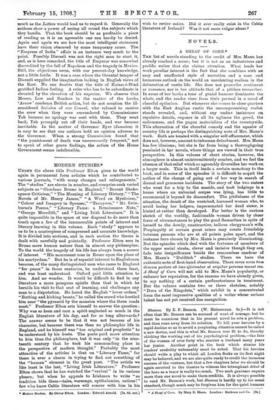NOVELS.
A SHEAF OF CORN.* THE list of novels standing to the credit of Mrs. Mann has already reached a score; but it is not as an industrious and prolific writer that she claims attention. What lends her work peculiar interest is the fact that she combines with an easy and unaffected style of narration and a sane and humorous outlook on the world an unrelenting realism in the delineation of rustic life. She does not proscribe sentiment or romance, nor is her attitude that of a pitiless researcher. In some of her books a tone of genial humour dominates the whole, and the reader rises from their perusal in a mood of cheerful optimism. But whenever she comes to close quarters with the East Anglian rustic the uncompromising realist stands revealed, and, without any undue insistence ma repulsive details, exposes in all its ugliness the greed, the callousness, and the pagan materialism of the countryside. This alternation of the cheerful comedy and the squalor of country life is perhaps the distinguishing note of Mrs. Mann's work. Both are treated with a singular self-effacement, which does not, however, amount to inhuman detachment. Mrs. Mann has few illusions; but she is far from being a thoroughgoing Pessimist in her novels, where things are viewed in their true perspective. In this volume of short stories, however, the atmosphere is almost unintermittently sombre, and we feel the absence of that relief which so agreeably diversifies her work on a larger scale. This in itself lends a certain monotony to the book, and in some of the episodes it is difficult to acquit the author of the charge of going out of her way in search of dismal and gruesome incidents. The story of the two sisters who went for a trip to the seaside, and took lodgings in a house where an unburied corpse was lying, has little to recommend it beyond its discomfort. The pitifulness of the situation, the deceit of the wretched, harassed woman who, to avoid losing her lodgers, impersonated her dead sister, is hinted at rather than developed. Far better is the curious sketch of the worldly, fashionable woman driven by sheer force of circumstances to play the good Samaritan in spite of herself to the dowdy, unattractive, tedious clergyman's wife,. Propinquity at certain great crises may create friendship between persons who are at all points poles apart, and the instance here chosen by Mrs. Mann is genuinely illuminating. But the episodes which deal with the fortunes of members of the upper social strata, clever and incisive though they are, fade into insignificance beside the remorseless candour of Mrs. Mann's " Dulditch" studies. There we have the authentic note of first-hand observation. There verae voces tuns demum pectore ab imo ejiciuntur et eripitur persona ma net res. A Sheaf of Corn will not add to Mrs Mann's popularity, or enhance her reputation, for the reasons we have already given, to say nothing of a certain perfunctoriness in treatment. But the volume contains two or three sketches, notably "Dora of the Ringolets," which exhibit in a concentrated form the most impressive qualities of a writer whose serious talent has not yet received due recognition.




































 Previous page
Previous page